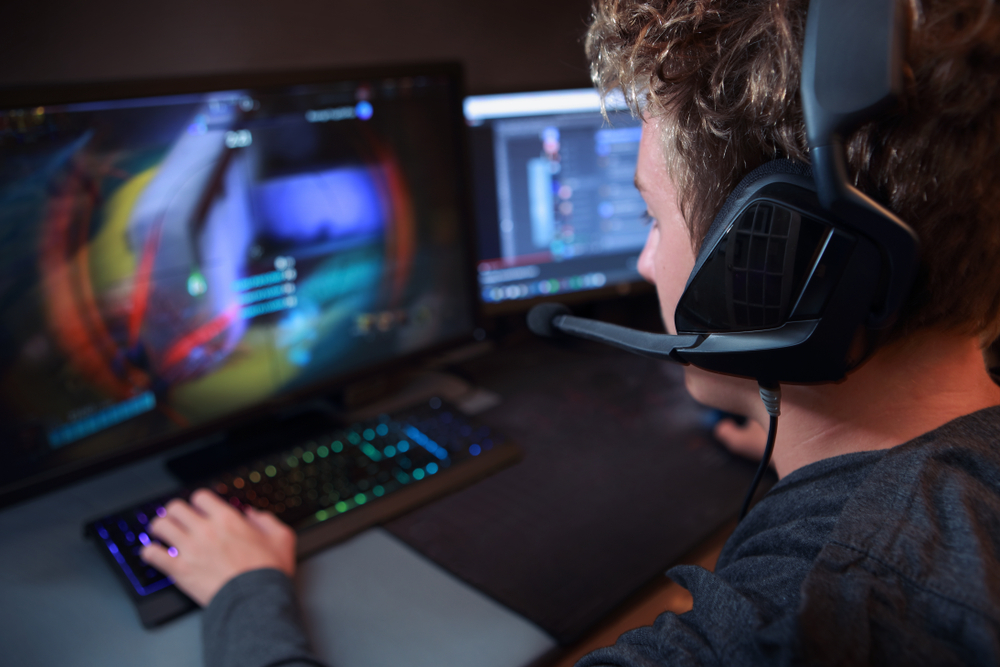The pull of online gaming on our kids – and how parents should try playing them at their own game.

Play – it is an essential part of a child’s life. It helps them develop social, emotional and intellectual skills.
Play can also give us tremendous self-worth. Imagine a child trying to get a basketball in the hoop. On their first attempt, the ball hits the backboard. The second time it teasingly spins round the hoop before dropping off the side. The third time…it goes in. As they approximate towards their goal, they are reinforced with a rush of dopamine which is both rewarding and also involved in habit formation.
And as parents we see and approve of this process, right? At least, we do when it’s outside on a ‘real’ court.
A sense of Identity and self-confidence
They feel like they’re achieving, and the behaviour and achievement is further reinforced by their social group. By paying them compliments, their friends encourage them to keep going. The child’s social status rises leading to a sense of identity and self-confidence. Combined, these factors incentivise them to keep playing.
The same thing happens with online gaming and video games.
However, whereas compulsion used to be a side effect of a game, online it is has become an integral part of game design. The dopamine hits are timed so as to keep you playing and seeking the next reward.
A surge in the popularity of games that allow multiple players to talk during play means children can be playing with people from around the world, all of different ages, in different time zones, all encouraging each other to keep gaming. The live element to game play has become particularly significant, where children prefer to be playing and talking in the moment with friends and feel left out if they are not able to take part in this.
More than half of Parents believe gaming helps to improve their child’s focus.

Many parents find it a struggle to get their children, particularly boys, to break off from playing games for meal times or to go to bed. Children lose track of time and find it hard to put the console down if they feel they are close to winning. Digital designers know this and create games that encourage players to stay online.
As we head towards the next school holidays, we know that many kids will be taking to their devices and exploring the latest games.
But there are positives to gaming online. The latest Internet Matters research shows that more than six out of 10 of parents believe that playing video games actually helps to improve their child’s problem-solving skills and more than half believe gaming helps to improve their child’s focus and concentration. A third of parents believe gaming helps their children with their academic progress.
Most of the problems around gaming arise when parents don’t know what their kids are up to online, and around the proportion of time that gaming takes up in relation to other social & physical activities.
Mums in particular feel out of depth when it comes to gaming.
Parents’ most common concern about gaming is their child being contacted by strangers while online yet a third of parents are unsure who their child is playing with and nearly half have never played a game themselves. That’s why we’re encouraging parents to do something that may well go against their nature and have a go – get involved.
Mums in particular feel out of depth when it comes to gaming; they do not always understand their child’s games – and find it hard to work out the appeal. Taking up online gaming will help mums and dads understand the benefits and risks for their children. Parents who regularly get involved with their children’s activities online are better placed to lead them through some of the issues they may face.
Parents feel both the nature and content of gaming has significantly evolved since they were children and gamed themselves, often on a single player handheld device or basic arcade games. Children are now playing with a variety of devices, online, potentially with people from around the world.
A legitimate career option for many children.

There has been a considerable shift from simple to complex games, where a greater skill set and enhanced creativity is required to play them.
Rather than this being a phase amongst children and young people, the appeal of gaming is snowballing.
Not only is gaming now a mainstream pastime, it is also a legitimate career option for many children and nearly half of parents are happy for their child to have a career in gaming.
Rapid progress is being made in gaming technology and we expect games with virtual reality and augmented reality will become mainstream. The development of different platforms, interfaces and consoles are likely to widen the knowledge gap that already exists between parents and children.
To help parents get their head around the new digital landscape and work out how it might impact their children, Internet Matters has launched a new comprehensive gaming hub full of advice and new resources for parents with children who game. The advice includes practical tips from setting parental controls to finding suitable games for your children.
By Dr Linda Papadopoulos, psychologist and Ambassador for Internet Matters


Trackbacks/Pingbacks